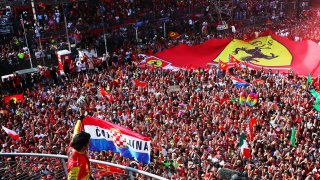
- The Middle Eastern oil-producing nations see F1 as critical to their economic diversification, and have invested enormous sums to secure it.
- Abu Dhabi, which held its first Grand Prix in 2009, spent $40 billion constructing an artificial island to do it.
- To continue growing, F1 will need to tread a narrow line between the sport's new audience and its core motor racing fans.
Who will win a 2026 Grand Prix?
Four circuits are vying for contract extensions, Thailand and South Korea have both submitted bids, while India, Rwanda, and numerous other countries are reported to be developing the infrastructure to secure a slot on the F1 calendar.
Get Tri-state area news delivered to your inbox.> Sign up for NBC New York's News Headlines newsletter.
The competition is so fierce that these bids often transcend sport. "We are receiving calls from prime ministers, from governments that really want to host the Grand Prix," F1 CEO Stefano Domenicali told CNBC's "Inside Track."
"This is not political, it is something really substantial."
For countries that could lose their spot on the calendar however, it is acutely political. The Belgian Grand Prix adds an estimated $248 million to the national economy each year. So, when the country's prime minister wrote to Domenicali in late 2023 to lobby for a contract extension beyond 2025, his message was clear: "The need for you to set up a balanced calendar between Europe, the Far East and America/Middle East will not happen to the detriment of Belgium."
Money Report
But someone will have to lose out. The Middle Eastern oil-producing nations see F1 as critical to their economic diversification, and have invested enormous sums to secure it. Abu Dhabi, which held its first Grand Prix in 2009, spent $40 billion constructing an artificial island to do it.
"The entire concept of the Formula One Abu Dhabi [started with] a blank canvas of Yas Island," Saif Rashid Al Noaimi, CEO of the island's management company Ethara, told CNBC.
"It didn't have anything before the plans for the Abu Dhabi Grand Prix." In 2023, the island welcomed 34 million visitors.
Saudi Arabia, which reportedly considered buying F1 outright, has also leveraged the sport to bolster its appeal as a tourist destination. A survey conducted by YouGov in 2023 showed that race fans across the U.S. were more than twice as likely to consider a trip to Saudi Arabia than other Americans.
"Formula One doesn't showcase the race, it showcases the city," Robin Fenwick, CEO of sports marketing agency Right Formula, told CNBC.
"And that's brilliant for the local economic impact and the lasting legacy it'll create."
Think of Monaco. The streets around the Monte Carlo harbor are synonymous with glitz, glamor, and motor racing. "Some shops do nearly three months of income in four days," Guy Antognelli, the general manager of the Monaco Government Tourist and Convention Authority, told CNBC.
"But because it's on at the same time as the Cannes Film Festival, the Cote d'Azur is really the center of the media tech world at that time."
Yet with Monaco currently paying nearly a third ($20 million) of what Saudi Arabia is to host a race, F1 may be unwilling to extend the country's contract after it runs out in 2025. In an interview with Bloomberg earlier this year, McLaren CEO Zak Brown said that the sport would survive without Monaco: "One could argue: 'wait a minute, some of these other venues are driving similar TV ratings, great racing and contributing a lot more to the growth of the sport fiscally.' You've got the Miamis, the Vegases, the Singapores – these are all awesome races."
F1 traditionalists would counter that the commercial focus will eventually come at the expense of the sport. The "dynamic pricing" algorithm which pushed Silverstone's four-day grandstand tickets to reach £600 ($774) in 2024 drew criticism from F1 legend Lewis Hamilton, who warned against pricing out families.
Much of the price increase owes itself to the growing popularity of Grand Prix weekends among families, however. Concerts from global superstars like Ed Sheeran in Miami and Stormzy at Silverstone have drawn a broader audience to race weekends, nudging F1 further into the mainstream.
Proponents of the "super-bowl" model point to the $1.2 billion in economic value that the Las Vegas Grand Prix added through flights, hotel bookings and restaurant receipts, as well as the infrastructure investments that F1 made to put on the event.
"I know how big the American Super Bowl is in terms of economic impact," Domenicali told CNBC. "We are bigger."
To continue growing, F1 will need to tread a narrow line between the sport's new audience and its core motor racing fans. This not only requires careful thought about which new experiences they introduce for fans, but which events they remove from the calendar. Like it or not, F1's growing economic influence means any decision will have a significant impact on someone.






